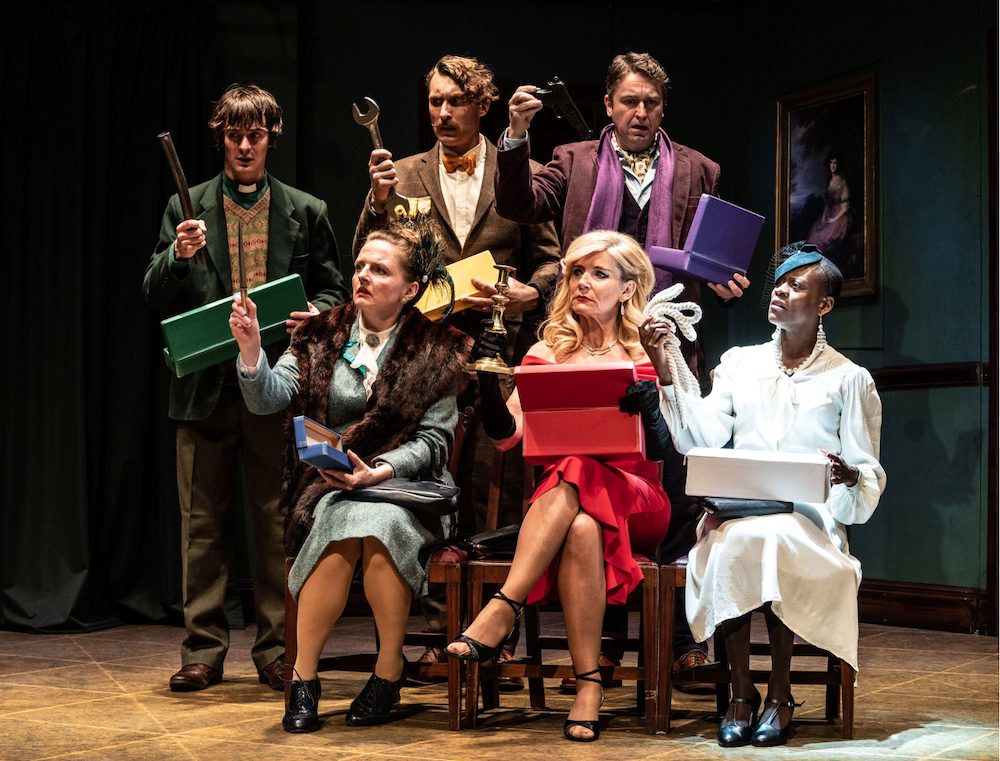Cluedo describes itself as “a new British play, based on an American play, based on an American film, based on a British board game.” More accurately, it’s a British-ised version of Sandy Rustin’s adaptation of the 1985 cult film Clue. The play hits the expected story beats that anyone who has played the game would expect – six strangers are invited by the mysterious Mr. Boddy to a country manor, only for him to turn up dead and the police on their way. The invitees, alongside butler Wadsworth, have less than an hour to ascertain the murderer’s identity, but things spiral out of control when more guests and staff members turn up dead.
Director Mark Bell, notable for The Play That Goes Wrong, has done his best to re-work Rustin’s original script, but for the most part it feels very basic. McCarthy-era America is switched out for Britain in the grip of the Lynskey tribunal and rudimentary jokes about Tories are peppered throughout. Granted an Agatha Christie-style big-house murder is a deeply British concept to begin with, but much of what unfolds feels incredibly on the nose.
Perhaps the greatest hindrance is that Cluedo lacks substance. Clocking in at around 80-minutes, the play feels rushed with little time dedicated to fleshing out the characters aside from singular traits – Colonel Mustard is an idiot, Mrs. Peacock an alcoholic, and Professor Plum lascivious. Granted they are meant to be pastiches but that doesn’t really work if, once these traits are stripped away, there’s nothing else to them. At the same time, the play suffers from bloating with certain jokes dragged out to the point where it feels like the cast are playing for time. That said, there are those in the audience who do find it hilarious – but it’s a select few, so it’s not necessarily for everyone.
There are some beacons of light, though. David Farley’s set design is genuinely inspired – using unfolding walls to create niches decorated as the lounge, study, and other classic Cluedo rooms, which then completely transform the rest of the stage. Similarly, while the script leaves much to be desired, the physical theatre and comedy is as good as one might expect from Bell. It’s also greatly enhanced by movement director Anna Healy‘s direction and cast members like Tom Babbage and Etisyai Philip who have worked on Bell’s previous productions.
That said, the cast themselves represent a mixed bag, though again this feels more a result of not having a great deal to work with. Even Michelle Collins, the obligatory celebrity attached to the production, is easily forgettable as Miss Scarlett. The exception is Jean-Luke Worrell whose mannerisms, facial expressions, and movements excellently channel Tim Curry’s iconic performance as Wadsworth in the original film and carry much of the production. Also worth noting is Harry Bradley who brings a great deal of characterisation to his ensemble roles and handles a wardrobe malfunction brilliantly – sadly this also proves to be perhaps some of the most consistent humour of the night.
Cluedo desperately needs more work to be the play it desires to be. While it should be the benchmark for Christie-esque parody, awkward pacing and a lack of substance means that it is vastly outshone by other similar productions. The result is another theatrical adaptation of a board game/film that maybe should have been left on the shelf.
